Soft and creamy Kesar Penda (Kesar Peda) are a golden yellow sweet made from milk, sugar and saffron. Each bite will melt in your mouth!
They’re perfect for special occasions and gifting.
Rakshabandhan is but a few days away from now and Kesar Penda are Brother Feasts’s favourite Indian mithai.
These dainty little buttons of milk dough and saffron are full of beautiful flavours and colours.
What are Penda (Peda)?
While the name can vary depending on region and local dialect, Penda (also known as Doodh Peda, Pedha and Pera) are essentially a sweet made with milk (milk solids to be more specific) and sugar.
From the milk and sugar base, the flavour of the Penda is open to wherever your imagination takes you.
What are the different flavours of Penda?
Traditional Penda you will find in Indian sweetmarts come in three varieties. Let’s explore them.
White Penda
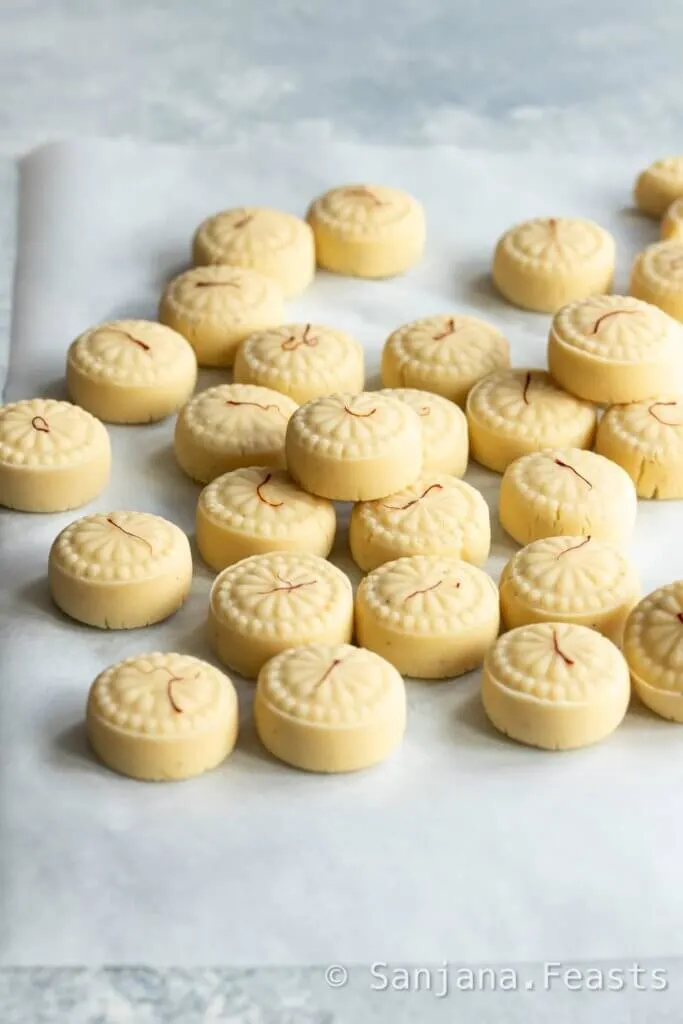
They may be simple, but the flavours of plain milk Penda are by no means basic!
Plain milk Penda are a classic take on the Indian sweet and a mithai-box staple when gifting Indian sweets.
They sometimes have a cardamom flavour. Nuts are optional.
Kesar Penda
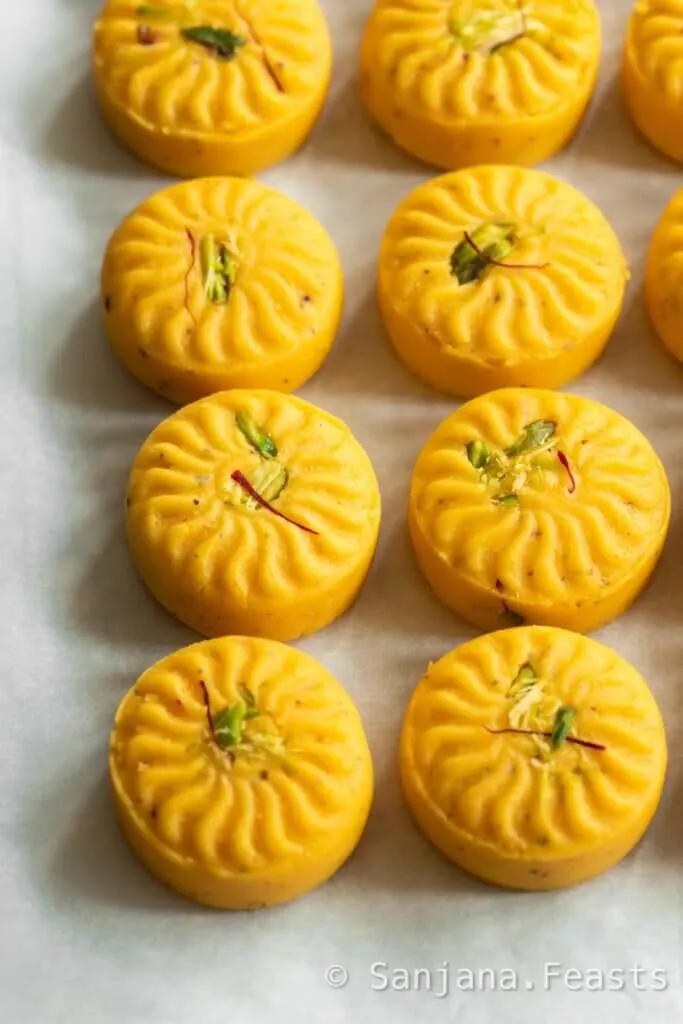
Today, we will explore yellow-coloured saffron milk penda, also known as Kesar Penda or Kesar Peda. These daffodil-coloured milk buttons are smooth, rich and arguably the most luxurious of all Penda.
With the price of saffron exceeding that of gold (per gram), Kesar Penda are quite literally the gold standard of Indian sweets.
Mawa Penda

Mawa Penda are typically brown in colour. Make them with caramelised milk solids, also known as mawa, khoya or khoa.
This is not to say Penda are limited to the flavours listed above. Feel free to tweak the recipe below to make Penda of any flavour that takes your fancy!
You could try anything from Almond Penda, to Mango Penda or even Cookies & Cream Penda. Be bold and go wherever your taste buds take you!
Other styles of Penda
Penda with condensed milk, microwave penda, paneer penda, ricotta penda, penda with cream, instant penda and milk powder penda. Which would you like me to make next?
Are Penda and Burfi the same?
While Penda and Burfi share similar ingredients, they have their own unique methods of preparation, textures and shapes.
Penda (Doodh Peda, Pedha and Pera)

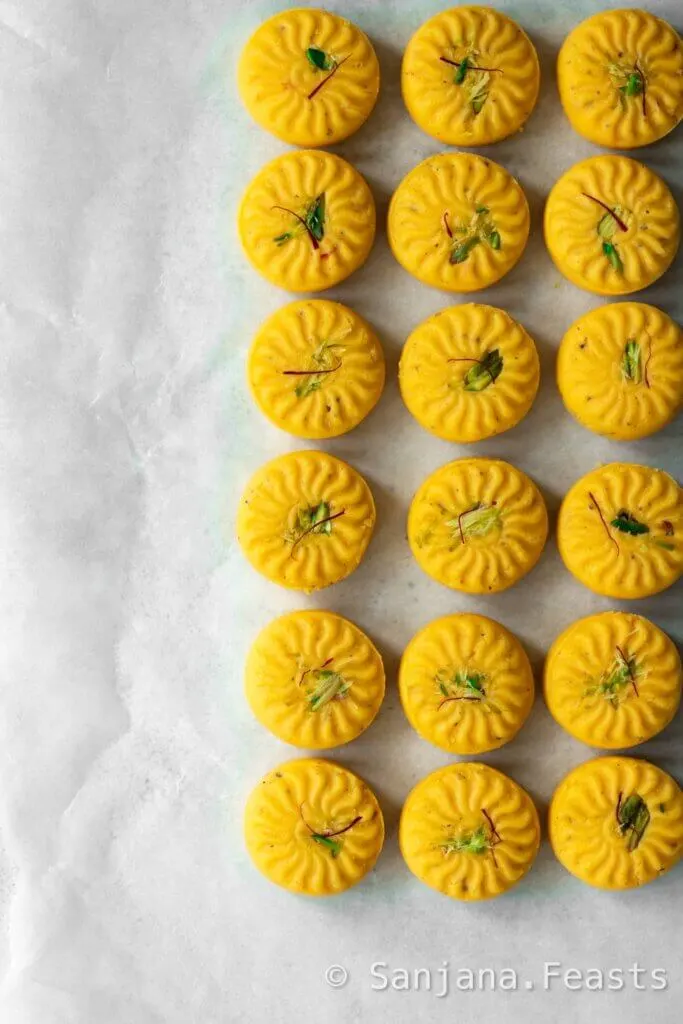
Penda originated in the city of Mathura in present-day Uttar Pradesh, Northern India. Today, there are dozens of varieties from across India.
These styles of Penda range from Rajkot na Penda (Gujarat), to Karnataka’s famous Dharwad Peda.
Indeed, the popularity of Penda extends far beyond the borders of India, as the Indian diaspora continue to celebrate their love of Indian heritage sweets in their home countries.
Fijian Pera and Guyanese Peera are also famed within communities around the world.
While recipes may differ depending on the cook, the concept of Penda is that it’s a milk-based sweet with a doughy texture, shaped into a ball and gently flattened into a thick button shape.
This is done either by hand or with a machine. Nuts are an optional decoration.
Like Laddoo, Penda are typically made as temple offerings (prashad).
Burfi (Barfi)
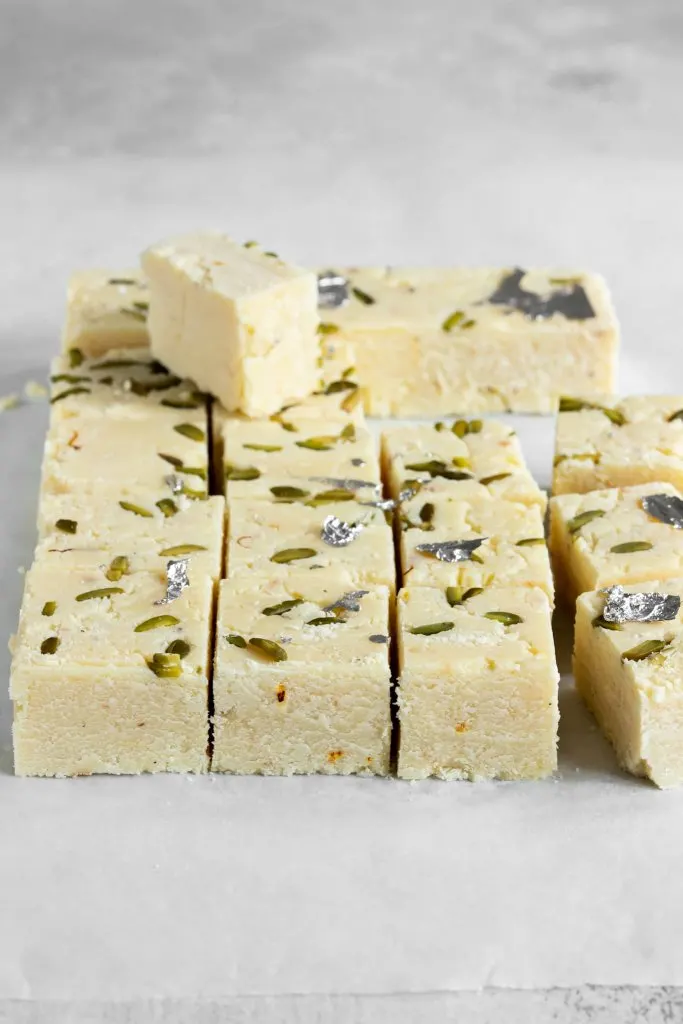

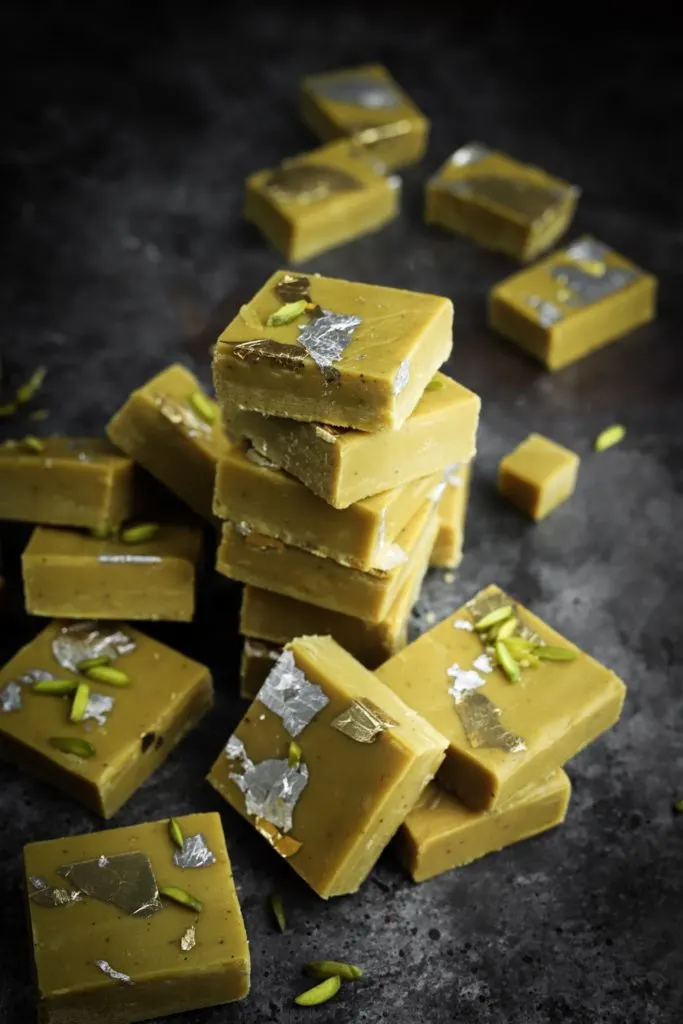
Burfi or Barfi are another milk-based Indian sweet. My recipe for Perfect Plain White Burfi calls for milk powder. In many cases, people use mawa (milk solids) which you can make by reducing full-fat milk.
When making Burfi, the mixture is set in a tray and cut into squares. Silver or gold leaf is a popular decoration, since they are usually temple offerings or gifts.
Burfi can come in dozens of varieties, flavours and colours.


Some of my favourite Burfi flavours include: Pistachio Burfi, Cookie Dough Burfi (microwave recipe), Birthday Cake Burfi, Easter Chocolate Burfi and Besan Burfi.
What do Penda taste like?
This depends on the flavour! Like most Indian sweets, Penda are indeed very milky and sweet with underlying hints of cardamom and saffron.
The texture of Penda is rich and creamy. Apart from a very subtle graininess, the mouthfeel of Penda is smooth. They will undoubtedly melt in your mouth.
Mawa penda have a delicious caramel flavour from the caramelised milk solids.
Kesar Penda (Kesar Peda): Step by Step with Photos
How to make Penda dough
Step 1: Prepare the paneer for Kesar Penda, cook and add spices

- Crumble and knead the paneer. Use either well-pressed homemade paneer (recipe for Homemade Paneer here) or use shop-bought paneer
- Cook the paneer with ghee until very soft. Stir all the time and then add milk powder
- Add saffron milk, cardamom, nutmeg and salt
- Remove from the heat
Step 2: Cool the Kesar Penda mixture, add food colour and sugar

- Cool the Penda mixture, uncovered at room temperature
- Add icing sugar
- Wrap the Penda mixture in cling film and refrigerate for 6-8 hours, or preferably overnight
Step 3: Knead and shape the Kesar Penda mixture


- Break the cooled Kesar penda mixture into small pieces
- Knead the mixture once more – it should feel pliable, relatively smooth and not too sticky
- Portion the Penda mixture into approximately 20g balls (you will have around 28-30 Penda in total)
- Top with slivered pistachios and a single saffron strand. Press the Penda gently with a Penda press, stamp or between your palms
Step 4: Allow the Kesar Penda to air dry



Arrange the formed Kesar Penda on a tray and leave in a cool, dry place (uncovered) for 6-8 hours, or until they’re dry to the tough. This final air drying will help the Penda form a dry crust on the outside.
How to shape Kesar Penda
Mould the Penda mixture by hand or use a penda maker. If you don’t have a penda maker, a mooncake or maamoul shaper will also work well.
Equipment for making Penda
Troubleshooting Kesar Penda (Kesar Peda)
Why are my Penda chewy?
Chewy Penda are a result of overcooking. The dough may seem slack when you take it off the heat but remember it must still cool and rest overnight. The ingredients will continue to develop in this time. Do not cook the mixture for too long simply based on how it looks when it’s in the pan.
Why is my Penda mixture sticky?
Sticky Penda can be down to three separate issues:
- The mixture needs to cook for longer
- Not enough fat in the mixture
- Too much sugar in the mixture

Why are my Penda not smooth?
Bumpy or overly grainy Penda may be down to dough that requires further kneading. It’s important to treat the Penda mixture like a bread dough. It requires kneading so a smooth and cohesive mass forms. This repetitive action will smooth the mixture out.
My Penda have lots of cracks. What’s the problem?
Small cracks in Penda are normal. If they are splitting a lot, this could be down to a combination of factors. Did you overcook the mixture or not knead it enough? Does the dough require further resting?
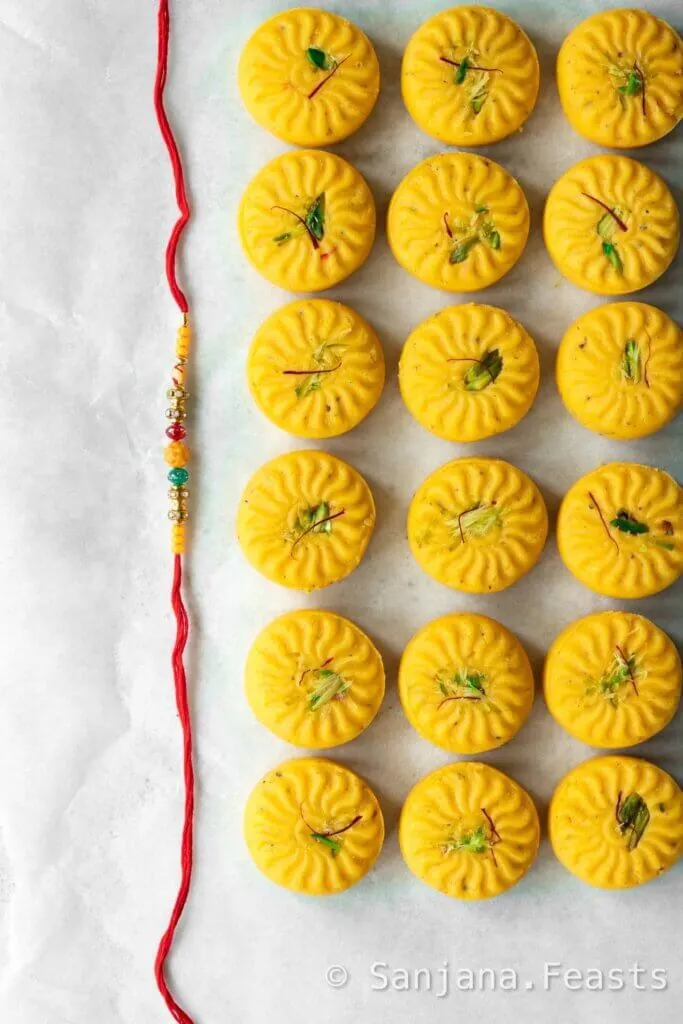
Kesar Penda (Kesar Peda) FAQ
How long do Penda keep for?
Keep Penda refrigerated in an airtight container for up to 3 weeks.
Can I freeze Penda?
Penda freeze pretty well. Be sure to pack them into an airtight container. Freeze for up to 3 months. Defrost at room temperature.
Are Penda vegan?
This recipe for Kesar Penda is not vegan. The traditional method for making Penda is a dairy-heavy process. A vegan version of the dish would require a completely different set of ingredients.

Are Penda gluten free?
Yes, this recipe for Penda is free from gluten. Be sure to check the labels of all ingredients to determine suitability.
Is this Penda recipe nut free?
No, I use nuts in my recipe for Penda. You can omit the nuts from the recipe and still make very delicious Penda.

What does it mean when someone calls you a Pendu?
Definition: A silly person or an individual who acts goofy. Similar to calling someone a banana or a jackass.
For example:
Person 1: Why did you embarrass me in front of my crush? Now she thinks I’m obsessed with duck herding, Quidditch and talking to my plants. You absolute pendu!
Person 2: Sorry mate, I don’t know what came over me. Maybe I am a pendu.
Kesar Penda (Kesar Peda) recipe | How to make Penda with paneer
Kesar Penda (Kesar Peda)

Soft and creamy Kesar Penda (Kesar Peda) are a golden yellow sweet made from milk, sugar and saffron. Each bite will melt in your mouth!
Ingredients
- 250 g crumbled paneer, homemade or shop bought
- 100 g full-fat milk powder
- 1 tbsp ghee
- 100 g icing sugar, (powdered sugar)
- 1 tbsp whole milk
- 1/4 tsp grated nutmeg
- 1 1/4 tsp ground cardamom
- 25 saffron strands, (a large pinch)
- A dab of yellow gel food colour
- Very small pinch of salt
To decorate:
- 2 tbsp slivered pistachios
- 28-30 saffron strands
Instructions
For the Kesar Penda Mix:
- In a small bowl, combine around 25 strands saffron with a tablespoon of warm milk. Set aside.
- Place the crumbled paneer in a large plate. Knead the paneer using the heel of your palm, smoothing out the grains. Repeat this 30-40 times, until you have a mixture that forms a ball.
- Melt the ghee in a large, non-stick pan. Add the paneer and use a spatula to mash the two ingredients together. Heat the mixture over a low heat, stirring all the time. Once the paneer has becomes slack and soft, add the milk powder and mix well.
- Next, add the saffron milk, ground cardamom, grated nutmeg and a very small pinch of salt (pinch the size of an unpopped kernel of popcorn). Mix well and remove from the heat.
- Spread the mixture in a large plate and allow to cool (uncovered) to room temperature.
- Add the yellow food colour and knead well to incorporate.
- Next, add all of the sugar. Use either a spatula or clean hands to knead the sugar in. It will begin to slacken and turn very stick. This is normal so don't panic!
- Wrap the tightly mixture in cling film and refrigerate for 6-8 hours, or preferably overnight. It will firm up into a stiff block.
To form the Kesar Penda:
- Break the chilled dough mixture up into small pieces and place in a large plate. Knead one final time, using the heel of your palm to work out any lumps. It should be smooth with very small grains.
- Make 20g balls out of the mixture. This mix makes around 28-30 Penda.
- Top the Penda with a few slivered pistachios and a single strand of saffron. Press the Penda gently with a Penda press, stamp or between your palms.
- Arrange the formed Kesar Penda on a tray and leave in a cool, dry place (uncovered) for 6-8 hours, or until they’re dry to the touch. This final air drying will help the Penda form a dry crust on the outside.
Notes
- Keep Penda refrigerated in an airtight container for up to 3 weeks.
- For white penda using paneer, simply omit the saffron and yellow food colour from this recipe.
- Penda freeze pretty well. Be sure to pack them into an airtight container. Freeze for up to 3 months. Defrost at room temperature.
Nutrition Information:
Yield: 28 Serving Size: 1 gramsAmount Per Serving: Calories: 54Total Fat: 3gSaturated Fat: 2gTrans Fat: 0gUnsaturated Fat: 1gCholesterol: 8mgSodium: 78mgCarbohydrates: 5gFiber: 0gSugar: 4gProtein: 2g
Pin this Kesar Penda (Kesar Peda) recipe for later!

If you like this, you’ll love my recipe for White Burfi
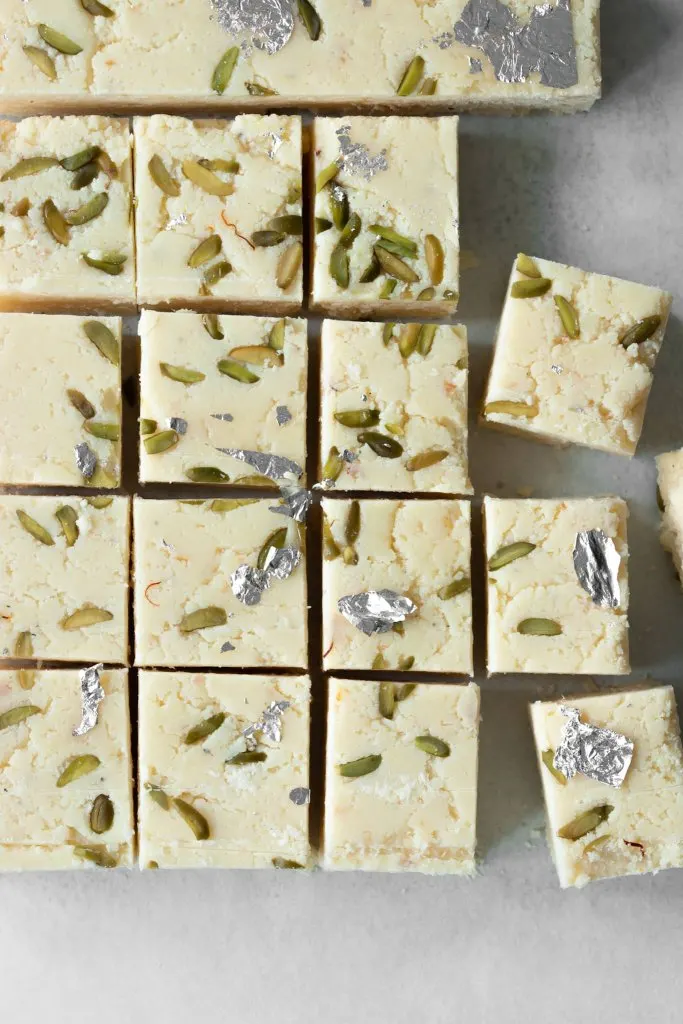
Love Sanjana


Jaynee
Wednesday 25th of October 2023
Is there a recipe for the plain white penda or would you just omit the saffron
Sanjana
Monday 30th of October 2023
Yes, you can omit the saffron. Enjoy!
LP
Wednesday 30th of August 2023
Can you use a kitchen aid mixer on low to knead? I have a bad arm and it makes is nearly impossible to do things the traditional way
Sanjana
Friday 15th of September 2023
Yes, I'm sure you can.
Lakshmi
Friday 28th of July 2023
Hi! Would the nutmeg add a bit of “spiciness” with a taste like that of pumpkin bread? Thank you!
Juanna
Monday 9th of January 2023
Can I use equal amounts of mawa (khoya) instead of paneer? Thanks
Sanjana
Sunday 26th of March 2023
Hi. This isn't something I've tried but best of luck!
Dinesh
Wednesday 25th of August 2021
Made it following your recipe and they penda turned out absolutely delicious. Finished in four days. So so decadent.